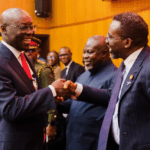
Ghana’s opposition New Patriotic Party (NPP), through figures such as former Finance Minister Dr. Mohammed Amin Adam, former Deputy Minister of Finance, Dr. Stephen Amoah, their loyalist Dr. George Domfeh, and other spokepersons and loyalist has sought to attribute the current government of President John Mahama’s economic successes including robust GDP growth, debt reduction, and single-digit inflation to an alleged “foundation” laid by their government up to January 2025, while dismissing NDC governments achievements as mere compliance with IMF-induced targets. This narrative is not only disingenuous but factually incorrect. As detailed in the 2025 Budget Statement and Economic Policy (presented March 11, 2025) and reaffirmed in the freshly tabled 2026 Budget Statement and Economic Policy presented November 13, 2025, by Finance Minister, Dr Ato Baah Forson, under the theme Resetting for Growth, Jobs, and Economic Transformation), the evidence tells a starkly different story.
Under the NPP, Dr Mahamadu Bawumiah-led Economic Management Team in 2024, Ghana consistently underperformed against key IMF programme benchmarks, with slippages in inflation control, fiscal balances, arrears management, and sectoral obligations that exacerbated vulnerabilities and left a legacy of fiscal risks. In contrast, the National Democratic Congress (NDC) government, since assuming office in January 2025, has not only met but overachieved on these targets through deliberate, homegrown policies emphasising fiscal prudence, monetary-fiscal policy coordination, a stable Cedi, improved domestic food supply, revenue mobilisation, and tight anti-corruption measures. This has delivered tangible results: accelerated growth, a predictable environment for households and businesses, restored investor confidence (evidenced by sovereign rating upgrades), and a trajectory toward medium-term sustainability, independent of external crutches.
The following numbered points, drawn directly from official fiscal outturns and IMF reviews cited in the aforementioned budget documents, dismantle the NPP’s assertions point by point. They highlight specific misses in 2024 (NPP era) and overachievements in 2025 (NDC era), underscoring the current administration’s superior stewardship.
- Under NPP in 2024, end-period inflation reached 23.8%, exceeding the IMF target of 18% by 5.8 percentage points and the budget target of 15% by 8.8 percentage points.
- Under NPP in 2024, the primary balance on a commitment basis recorded a deficit of 3.9% of GDP, worsening from -0.2% in 2023 and missing the IMF target surplus of 0.5% of GDP by 4.4 percentage points.
- Under NPP in 2024, the overall fiscal balance on a commitment basis was a deficit of 7.9% of GDP against an IMF target of 4.2%; on a cash basis, it was -5.2% of GDP against -5.3%.
- Under NPP in 2024, total central government arrears/payables reached GH¢67.5 billion (5.7% of GDP), excluding US$1.73 billion to IPPs, GH¢68 billion owed by ECG, GH¢32 billion by COCOBOD, and GH¢5.75 billion by Road Fund.
- Under NPP in 2024, MDAs committed GH¢194 billion (16.5% of GDP) via unbudgeted, uncertified, and unauthorised contracts, violating the Public Financial Management Act, with the road sector over GH¢100 billion.
- Under NPP in 2024, cocoa production dropped nearly 50% over three years; the 2023/24 season under-supplied 330,000 tonnes, causing US$840 million revenue loss from low-priced forward contracts and an additional loss of US$495 million in 2025 over the rolled-over contracts.
- Under NPP (2020–2024), the NDC government’s 2025 comprehensive audit exposed US$31 billion in abused Import Declaration Forms (IDFs)—fake transactions with no goods imported—draining reserves, weakening the cedi, and diverting funds meant for schools, roads, and hospitals.
- Under NPP (2020–2024), the same NDC government’s 2025 audit uncovered GH¢76 billion in under-declared imports (costing GH¢11 billion in lost revenue) and 17,700+ IDFs exceeding Bank of Ghana limits, channelling US$20 billion in unverified illicit transfers. This is an organised system of exploitation.
- Under NPP in 2024, the NDC government’s independent validation audit of inherited GH¢68.8 billion arrears/payables rejected GH¢10.4 billion for fraud (duplicates, inflated invoices, falsified receipts, no work done)—averting GH¢1 billion in near-payouts—while reclassifying GH¢2 billion and reviewing GH¢8.6 billion more for legitimacy, saving billions and restoring transparency.
- Under NPP (2016–2024), the debt service reserve dollar account (Sinking Fund) dwindled to just US$64,000 by January 7, 2025, from US$319 million in 2016; the cedi account dropped to GH¢143 million from GH¢430 million, exposing Ghana to severe default risks and fiscal instability.
These indicators from 2024 under the NPP reveal a grim chapter of economic mismanagement (even under the IMF programme), where unchecked spending and poor planning plunged households and ordinary Ghanaians into deeper hardship and widened the poverty bracket. Soaring prices eroded savings, making basics like bread and transport unaffordable. Massive unpaid bills choked businesses, stalling projects and jobs, while illegal, unbudgeted deals siphoned public funds into shadowy contracts, echoing a Ponzi-like gamble on borrowed illusions. Cocoa’s collapse robbed farmers of livelihoods and the nation of vital income, leaving a trail of debt and distrust. This reckless stewardship betrayed trust, inflating crises that the NDC now mends with steady hands. Yet, from this inheritance of chaos, the NDC administration has swiftly pivoted to restoration, harnessing disciplined fiscal and monetary policies to ignite a resurgence that benefits every corner of Ghana. Witness the tangible fruits:
- Under NDC in 2025 H1 (1st half of the year- January-June), overall real GDP grew 6.3%, exceeding the annual IMF target of 4.0%.
- Under NDC in 2025 H1, non-oil real GDP grew 7.8%, exceeding the IMF target of 4.8%.
- Under NDC in October 2025, headline inflation fell to 8.0%, below the IMF end-year target of 11.9% and returning to single digits for the first time in four years.
- Under NDC by September 2025, the primary balance on a commitment basis achieved a surplus of 1.6% of GDP, exceeding the IMF Q3 target of 0.6% and on track for the full-year 1.5%.
- Under NDC by September 2025, overall fiscal balance on a commitment basis was a deficit of 1.5% of GDP, better than the IMF Q3 target of 3.2%; on a cash basis, -2.3% vs the target -4.0%.
- Under NDC by September 2025, the primary balance on a cash basis achieved a surplus of 0.7% of GDP, better than the IMF Q3 target deficit of 0.2%.
- Under NDC by October 2025, gross international reserves covered 4.8 months of imports, exceeding the IMF floor of 3 months.
- Under NDC in 2025, met all IMF end-June 2025 performance criteria and targets, including inflation within consultation band; implemented 9 of 11 structural benchmarks by September.
- Under NDC by October 2025, the public debt-to-GDP ratio fell to 45.0% from 61.8% at end-2024, with external debt down 23.4% to GH¢319.2 billion.
- Under NDC in 2025, sovereign ratings upgraded: Fitch to ‘B-‘ (Stable) in June; Moody’s to ‘Caa1’ (Stable) in October; S&P to ‘B-/B’ (Stable) in November.
- Under NDC in 2025, Bank of Ghana reduced policy rate by 650 bps from 28% to 21.5% to curb inflation resurgence, lowering credit costs, enhancing liquidity, and spurring business recovery/jobs; external balances strengthened, financial sector stabilised and capitalised, fiscal discipline restored through expenditure controls, revenue mobilisation, and social interventions for sustained growth.
These milestones under the NDC government in 2025 signal a profound turnaround, breathing new life into Ghana’s economy after years of strain. Stronger growth in the first half reflects thriving businesses, more jobs, and rising incomes, especially beyond oil dependency. Tamed inflation means everyday costs like food and fuel are easing, putting smiles back on family tables after a long hiatus from single digits. Prudent budgeting has flipped deficits into surpluses, building a safety net against shocks and slashing debt burdens. Robust reserves guard against global turbulence, while full IMF compliance and rating upgrades draw investors, fueling infrastructure, farms, and skills training. It’s the “Reset Agenda” in action: inclusive progress for all Ghanaians. The NPP’s revisionist claims crumble under scrutiny, exposing their eight years of mismanagement as a betrayal of Ghana’s promise. Under President Mahama’s visionary leadership and the watch of Prof. Naana Jane Opoku-Agyemang-led Economic Management team with Dr Ato Baah Forson as Finance Minister and Dr Johnson Asiamah as the Central Bank Governor, the NDC’s “Reset Agenda” is forging Growth, Jobs, and Economic Transformation. Let’s build on this foundation for a prosperous Ghana we all deserve.
*****
Julius is an innovative Gender and Development Finance Expert with over 12 years of experience driving impactful initiatives across Africa. Julius holds master’s degrees-an MSc in Africa and International Development from the University of Edinburgh, UK, and an MSc in Economics and BSc. Actuarial Science, both from the Kwame Nkrumah University of Science and Technology (KNUST).




